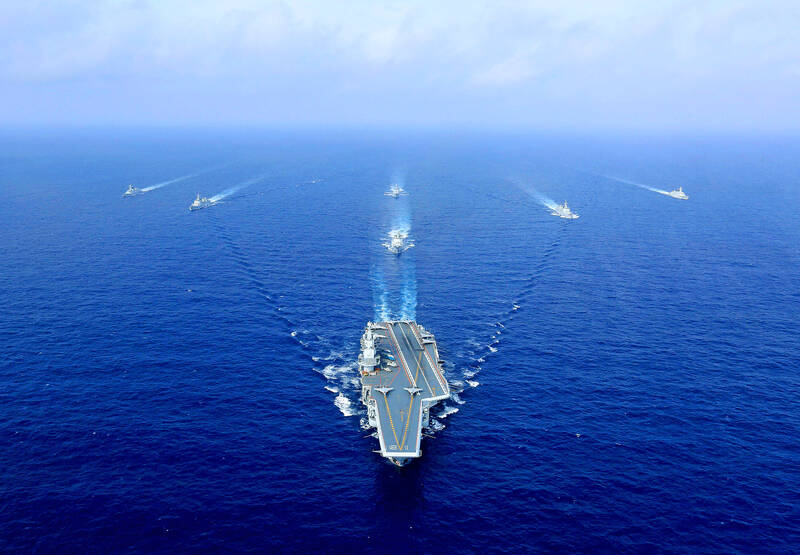Over the years Foreign Affairs has offered innumerable light comedies on the subject of Taiwan. Who can forget Robert Ross’ immortal “Taiwan’s Fading Independence Movement” (March/April 2006), now fading into its second decade of silliness? Or Charles Glaser’s droll “Will China’s Rise Lead to War?” (March/April 2011), which argued that Taiwan should be sold out to China to preserve the peace.
Foreign Affairs also gave us Bruce Gilley’s argument for Finlandizing Taiwan: “Not So Dire Straits: How the Finlandization of Taiwan Benefits US Security” (Jan/Feb 2010), which Nat Bellochi, former chairman of the American Institute in Taiwan, dismissed as “an analysis that is so far removed from reality that it would be dismissed out of hand for its lack of understanding and its outright naivete.”
Gilley would go on to earn global vilification by attempting to argue that European colonialism was a good thing in Third World Quarterly.

Photo: AFP
Hence, it was hardly surprising that Foreign Affairs hosted a piece in which a gaggle of people it called “experts” were invited to comment on whether the US should give up “strategic ambiguity” and declare what its red lines were in the Taiwan scenario.
TAIWAN REPRESENTATION LACKING
Where was Taiwan? You guessed it, dear reader: no Taiwan-based scholar was asked to comment on this topic of mortal interest to Taiwan. Indeed, arguably, not a single Taiwan expert save the redoubtable but US-based Jessica Drun and Tiffany Ma* were asked to comment.

Photo: AFP
What makes the “strategic ambiguity” debate so irrelevant? The debate treats Taiwan as an object and not a participant. People are still arguing, in the best 2005 style, that Taiwan could recklessly declare independence and trigger a war, so the US needs to deter that. Say what?
In a masterful discussion of “strategic ambiguity” earlier this month, “Strategic Ambiguity Out of Balance: Updating an Outdated Taiwan Policy” (The Strategy Bridge, Nov. 9), US Naval War college professor Yvonne Chiu neatly dismissed such commentary: “To hold onto strategic ambiguity in order to deter Taiwanese declaration of independence posits a moral equivalence where there is none.”
A couple of commenters argued that a clear declaration of US policy would enable Taiwan to a “free ride” on US defense. Quite the opposite: if Taiwan knows the US will come in it can make useful and complementary investments. Ambiguity serves only the pro-China side in Taiwan, who argue unceasingly that the US cannot be trusted to intervene, so why prepare to fight?
OUTDATED ARGUMENTS
The “deter Taiwan independence” and “free rider threat” claims are old arguments that simply signal the speaker remains in the 1990s when the strategic and political situation was simpler. That world was killed in the late 1980s when Chinese planners began envisioning a navy that could challenge the US.
The Foreign Affairs piece was a brilliant demonstration of what I’ve been arguing for quite some time: the growing public debate on “strategic ambiguity” signals its irrelevance, not the need to change the policy. As several of the people who contributed noted, China assumes the US will respond if it invades. Why change anything?
Irrelevant this debate may be, it remains indicative. Apparently no one in the Foreign Affairs editorial office possesses anything as exotic as a map, let alone basic geostrategic sense. Not a single scholar based in Japan or the Philippines, two nations that would be deeply affected by a cross-strait war, was brought in to comment.
Yet, Foreign Affairs found space for the former Mexican Ambassador to China, now in a consultancy, along with someone from another China consultancy. The Big Establishment think tanks were there, a CATO scholar and some important names in the China field. Even Charles Glaser was asked. In fairness, he wrote: “I believe the United States should end its commitment to Taiwan” and his comment was among the more robust and interesting.
Somehow there was room for a researcher from the Oslo Peace Institute whose research focus is China-Africa relations, and another random scholar who writes on China-Japan relations and rare earths. Scholars from Vietnam, Korea, Malaysia or Indonesia? Perish the thought.
Gosh, if only I had thought to name my blog The View from Rare Earths, I could have been there too!
Also cited in the Foreign Affairs piece were people from the Quincy Institute, which reproduces pro-Putin and pro-China fare, along with the Carnegie Institute for Peace, which has institutes in China. I noticed at least one name that received funding from a Chinese billionaire. Why do major media organs continue to source commentary from such individuals?
CHINA’S NAVY
The other reason this “strategic ambiguity” debate looks like something constructed by the philosophers of Laputa is its disconnect from the reality of America’s stagnant naval power. It is pointless to talk about “strategic ambiguity” while China’s naval might mushrooms. Writers constantly mine the 20th century for historical analogies, but the US is a lot more like the Spain of Philip III than the Yankee juggernaut of Franklin Roosevelt.
We are on our fourth presidential administration in the last two decades, with China continuously signaling that it wants to displace us, and still there is no sense of urgency in Congress or the administration of US President Joe Biden about the Navy.
Indeed, next year the US navy plans to decommission 39 ships, including five older Ticonderoga class cruisers that boast a total of 610 vertical launch silos, according to recent media reports. There is nothing out there to replace that firepower.
By contrast, China’s navy commissioned 32 ships last year. By 2025, the most recent Congressional Research Service report calculates, it will have over 400 ships, and a fleet of land-based ballistic missiles developed specifically to kill ships. It will also have a panoply of aviation weaponry, including swarms of drones.
Developed in parallel to complement its formal navy, China also has an enormous “seaborne militia,” its fishing and coast guard vessels, seldom counted by anyone but Chinese planners.
China will likely remain behind the US in ship size and overall tonnage, as well as number of vertical launch silos, and in many capabilities. But not building a new navy and the necessary cargo ships and logistics infrastructure to match China and support a war in Asia?
That’s an unambiguous message.
* The original version of this article didn't mention Tiffany Ma as being a Taiwan specialist. The Taipei Times regrets the error.
Notes from Central Taiwan is a column written by long-term resident Michael Turton, who provides incisive commentary informed by three decades of living in and writing about his adoptive country. The views expressed here are his own.

On April 26, The Lancet published a letter from two doctors at Taichung-based China Medical University Hospital (CMUH) warning that “Taiwan’s Health Care System is on the Brink of Collapse.” The authors said that “Years of policy inaction and mismanagement of resources have led to the National Health Insurance system operating under unsustainable conditions.” The pushback was immediate. Errors in the paper were quickly identified and publicized, to discredit the authors (the hospital apologized). CNA reported that CMUH said the letter described Taiwan in 2021 as having 62 nurses per 10,000 people, when the correct number was 78 nurses per 10,000

As we live longer, our risk of cognitive impairment is increasing. How can we delay the onset of symptoms? Do we have to give up every indulgence or can small changes make a difference? We asked neurologists for tips on how to keep our brains healthy for life. TAKE CARE OF YOUR HEALTH “All of the sensible things that apply to bodily health apply to brain health,” says Suzanne O’Sullivan, a consultant in neurology at the National Hospital for Neurology and Neurosurgery in London, and the author of The Age of Diagnosis. “When you’re 20, you can get away with absolute

May 5 to May 11 What started out as friction between Taiwanese students at Taichung First High School and a Japanese head cook escalated dramatically over the first two weeks of May 1927. It began on April 30 when the cook’s wife knew that lotus starch used in that night’s dinner had rat feces in it, but failed to inform staff until the meal was already prepared. The students believed that her silence was intentional, and filed a complaint. The school’s Japanese administrators sided with the cook’s family, dismissing the students as troublemakers and clamping down on their freedoms — with

As Donald Trump’s executive order in March led to the shuttering of Voice of America (VOA) — the global broadcaster whose roots date back to the fight against Nazi propaganda — he quickly attracted support from figures not used to aligning themselves with any US administration. Trump had ordered the US Agency for Global Media, the federal agency that funds VOA and other groups promoting independent journalism overseas, to be “eliminated to the maximum extent consistent with applicable law.” The decision suddenly halted programming in 49 languages to more than 425 million people. In Moscow, Margarita Simonyan, the hardline editor-in-chief of the